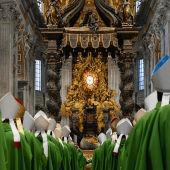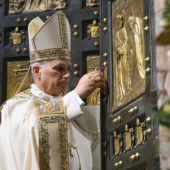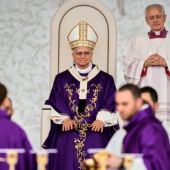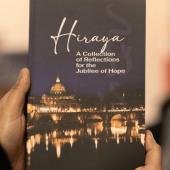Pope Francis stresses importance of religion for world peace
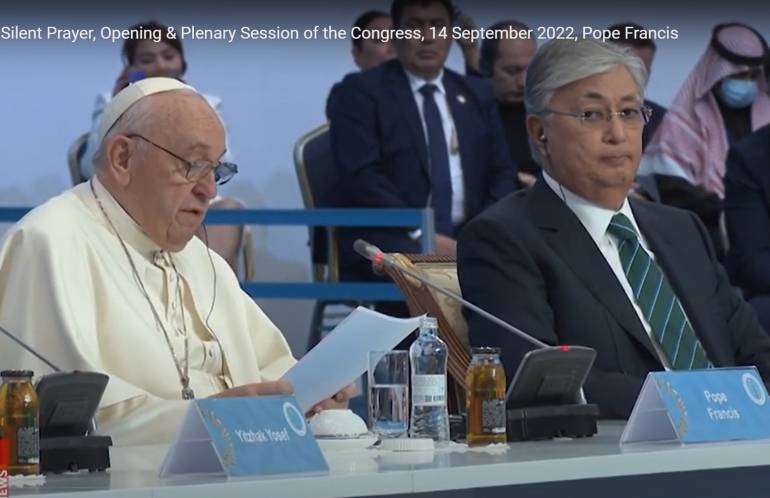
At the 7th Congress of Leaders of World and Traditional Religions, Pope Francis reiterated the importance of religion for world peace.
He addressed over 100 delegates from 50 countries comprised of religious, cultural, civil, governmental, and non-governmental representatives in Nur-Sultan, Kazakhstan, on September 14.
The church leader insisted, "We need religion to respond to the thirst for world peace and the thirst for the infinite that dwells in the hearts of each man and woman."
Recalling that fundamentalism "defiles and corrupts every creed," the Pope urged that all must have "open and compassionate hearts."
Pope Francis said, "The importance of religious freedom is an essential condition for genuinely human and integral development."
He noted that being created freely, every person has the right to render public testimony to his or her creed, proposing it without ever imposing it by proselytism or indoctrination.
The theme of the 7th Congress is "The Role of Leaders of World and Traditional Faiths in the Socio-Spiritual Development of Humanity after the Pandemic."
Reflecting on the theme of this Congress, the Pope focused on four challenges the world faces and urged religions to work together toward a greater unity of purpose.
Pope Francis presented the first global challenge as "vulnerability and responsibility."
He pointed out "our common vulnerability" and the need for help during the COVID-19 pandemic.
He lauded the result of the pandemic as a "powerful sense of solidarity" and reminded all not to waste it.
The Pope said that religions are "called to be present on the front lines, as promoters of unity amid the grave challenges that risk dividing our human family even further."
He invited all to move forward from their shared vulnerability with greater humility and foresight.
The Pope added that believers are "called to care" for humanity and become "artisans of communion, witnesses of a cooperation that transcends the confines of our community, ethnic, national, and religious affiliations."
He proposed to begin by listening to the poor, the neglected, and the helpless.
"What I propose is not only a path to greater attentiveness and solidarity but also a path to healing for our society. For poverty is precisely what enables the spread of epidemics and other great evils that flourish on the terrain of poverty and inequality," he said.
The second global challenge the Pope highlighted is the challenge of peace.
The Pope observed, "The scourge of war and confrontation still plagues the world," and it requires a "leap forward" by the great religions to actively unite and commit to peace.
The church leader said, "God is peace. He guides us always in the way of peace, never that of war."
The Pope insisted on resolving conflicts not using power, arms, and threats, but with encounters, dialogue, and patient negotiations, which can make progress when considering future generations.
He said, "Let us, I beg you, invest in education rather than more weapons!"
The third global challenge is "fraternal acceptance."
The Pope pointed out that born and unborn children, migrants, and elderly people are rejected daily.
He said, "It is the task of the religions to remind the world" that "every human being is sacred," while recalling the massive migration of people caused by war, poverty, and climate change.
Francis said, "We must consider others as God takes care of each creature and in them to see the face of a brother or sister."
The Pope urged, "Let us rediscover the art of hospitality, of acceptance, of compassion."
He invited all to experience the healthy shame born of compassion for those who suffer, and to feel sympathy and concern for their condition and fate.
He said, "This is the path of compassion, which makes us better human beings and better believers."
Pope Francis emphasized the fourth challenge as "care for our common home" and protecting the environment from damage caused by humans through pollution, exploitation, and devastation.
He pointed out that "the mindset of exploitation" is destroying our common home and leading to "an eclipse of the respectful and religious vision of the world willed by the Creator."
Pope Francis urged everyone to "move forward together, so that the journey of religions may be increasingly marked by friendship." -With input from Vatican News
Radio Veritas Asia (RVA), a media platform of the Catholic Church, aims to share Christ. RVA started in 1969 as a continental Catholic radio station to serve Asian countries in their respective local language, thus earning the tag “the Voice of Asian Christianity.” Responding to the emerging context, RVA embraced media platforms to connect with the global Asian audience via its 21 language websites and various social media platforms.









